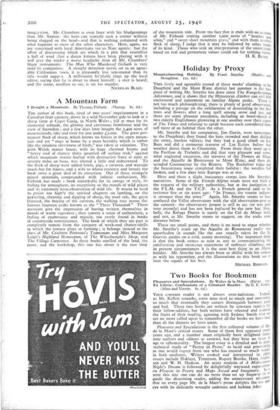A Mountain Farm
I Bought a Mountain. By Thomas Firbank. (Harrap. 8s. 6d.)
THE author of this book, tired of two years' imprisonment in a Canadian fruit cannery, drove in a wild November gale to look at a sheep farm at Capel Curig, in North Wales ; fell at once for its elemental solitude, the gloomy and cavernous farmhouse and the view of Snowdon ; and a few days later bought the 2,400 acres of mountainside, lake and river for just under L5,000. The great per-. manent flock of sheep, which knows no fences in the open moun- tain and yet " stays at home by a mass heredity which is rather like the intuitive cleverness of birds," was taken at valuation. The grim Welsh manor house, with its huge chestnut beams and "heavy roof of clumsy slates quarried off surface rock," against which mountain storms hurled with destructive force at sixty or seventy miles an hour, was altered a little and redecorated. To the flock of sheep were added fowls, pigs, a caravan, and wayside snack-bar for hikers, and a wife to whose resource and beauty the book owes a great deal of its attraction. Out of these strangely mixed materials, compounded with infinite enthusiasm, Mr. Firbank has made a book remarkable for its energy of style, its feeling for atmosphere, its receptivity to the moods of wild places and its extremely keen observation of wild life. It woula be hard to praise too highly the spirited chapters on lambing, on the ga iiering, shearing and dipping of sheep, the wool sale, the great blizzard, the buying of the caravan, the walking race across the famous fourteen peaks known as the " Three Thousand." These accounts give the impression of having written themselves in moods of warm eagerness ; they convey a sense of authenticity, a feeling of exuberance and muscle, too rarely found in books of countryside reminiscence. The book of which they are part is completely remote from the category of week-end chatter-idylls in which the townee plays at farming ; it belongs instead to the class of Mr. Crichton Porteous's Teamsman and Miss Margaret Leigh's Highland Homespun, of The Wheelwright's Shop, and The Village Carpenter. As these books smelled of the land, the moor, and the workshop, this one has about it the rare tang of the mountain side. From the fact that it ends with an account of Mr. Firbank renting another i,000 acres of " heather and whin," and " sweet short mountain grass," and with them another flock of sheep, I judge that it may be followed by other books of its kind. Thosa who seek an interpretation of the countryside based on real and permanent values could ask for nothing better.
H. E. BATES.






























 Previous page
Previous page